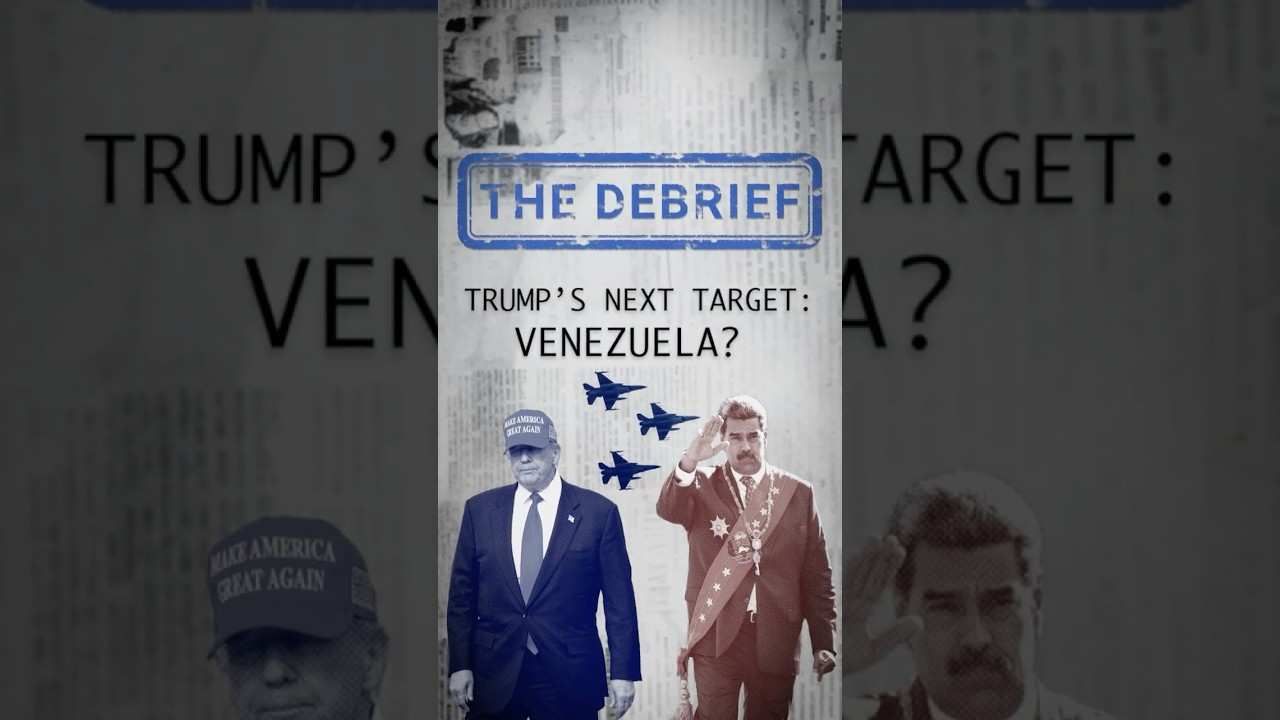November 04, 2025
President Trump reportedly hasn't yet decided whether or not to invade Venezuela. But the fact that a man who got elected on ending endless wars is even considering waging war in the Western hemisphere is remarkable. How did we get here, and what happens next? Eurasia Group's Risa Grais-Targow breaks it down in the latest episode of #TheDebrief
Trump's been cagey on whether or not the US will go to war with Venezuela, but would he? Here's how it could happen and why.
So here's the context. Trump has started taking the war on drugs literally. You've probably seen US strikes on boats in the Caribbean allegedly carrying drugs, an issue that plays well with Trump's base in both red states and swing states and makes Democrats look weak. There's also concerns around migration flows, an issue that is very important for key advisors like Stephen Miller within the cabinet.
But this is about more than appearing tough on drugs and immigration. It's also about regime change. Ousting President Nicolas Maduro is unfinished business from Trump's first term and a key priority for Secretary of State, Marco Rubio.
There's also an element of psychological warfare here. You have a massive US military buildup just off the coast of Venezuela aimed at getting in Maduro's head, and it just might work.
Geopolitics are also key here. Trump is keen to show China that the US is strong in its backyard, Latin America, as we saw with his moves related to the Panama Canal earlier this year. He's also taking advantage of the fact that Maduro's typical allies, Russia, Iran, China, are either weak or distracted and are unlikely to come to his rescue. All of this suggests that the US may be readying for moves against Venezuela.
Obviously, US war with Venezuela would be a huge deal, but it's also about short-term political wins versus a long-term strategy, and that means that it could escalate very quickly.There's also competing interests within Trump's cabinet. For Stephen Miller, this is about testing the limits of presidential power while Rubio is more focused on toppling a leftist regime in the region that he sees as propping up other leftist regimes, including Cuba and Nicaragua.
Then there's Trump himself, who may or may not lose interest, especially if this is something that's not going to deliver a quick win.
So which way is this going to go? Here are a few things to look out for. The first is an escalation of "Maduro Must Go" rhetoric coming from the White House, something that we're just starting to see. The second is a broader campaign against cartels in the region that shifts the US focus to other countries like Mexico and Colombia.
Finally, there's strikes within Venezuelan territory itself, which could put the US on a clear path to escalation, at which point we may be past the point of no return. And unfortunately, the thing about a point of no return is that you don't always know you're there until you've passed it.
More For You
Prime Minister Narendra Modi, with President of the European Council António Luís Santos da Costa, and President of the European Commission Ursula von der Leyen, at Hyderabad House, in New Delhi, India, on Jan. 27, 2026.
DPR PMO/ANI Photo
On Tuesday, the world’s largest single market and the world’s most populous country cinched a deal that will slash or reduce tariffs on the vast majority of the products they trade.
Most Popular
Sponsored posts
Five forces that shaped 2025
What's Good Wednesdays
What’s Good Wednesdays™, January 28, 2026
Mexican President Claudia Sheinbaum Pardo stands alongside Canadian Prime Minister Mark Carney and US President Donald Trump during the 2026 World Cup draw at the John F. Kennedy Center for the Performing Arts in Washington, D.C., on December 5, 2025.
Deccio Serrano/NurPhoto
Canadian Prime Minister Mark Carney has repeatedly tussled with US President Donald Trump, whereas Mexican President Claudia Sheinbaum has tried to placate him. The discrepancy raises questions about the best way to approach the US leader.
Fighters of the Qassam Brigades, the armed wing of the Palestinian Islamist Hamas movement, attend a rally marking the 35th anniversary of the group's foundation in Gaza City on December 14, 2022.
Photo by Majdi Fathi/NurPhoto
10,000: The number of Hamas officers that the militant group reportedly wants to incorporate into the US-backed Palestinian administration for Gaza, in the form of a police force.
Walmart is investing $350 billion in US manufacturing. Over two-thirds of the products Walmart buys are made, grown, or assembled in America, like healthy dried fruit from The Ugly Co. The sustainable fruit is sourced directly from fourth-generation farmers in Farmersville, California, and delivered to your neighborhood Walmart shelves. Discover how Walmart's investment is supporting communities and fueling jobs across the nation.
© 2025 GZERO Media. All Rights Reserved | A Eurasia Group media company.
